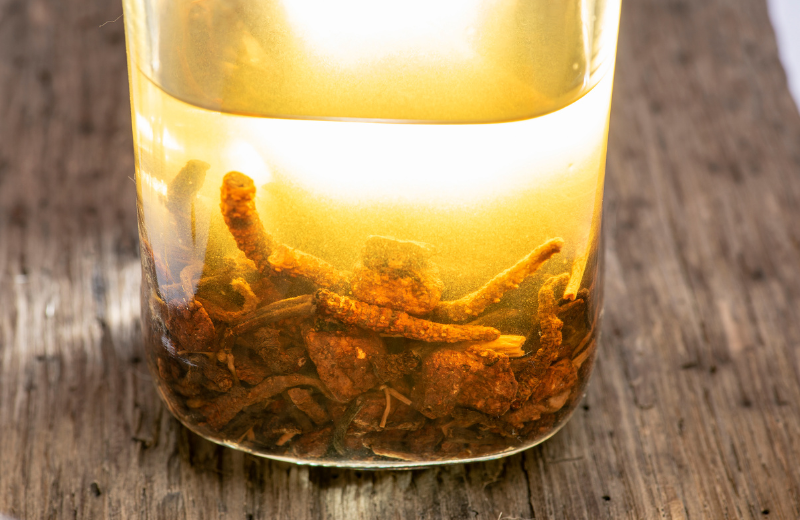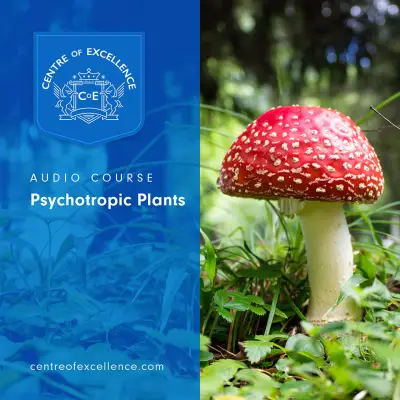If you’ve ever found yourself intrigued by natural supplements that claim to boost energy, support immunity, or even act as a “natural Viagra,” you may have come across Cordyceps. With a reputation that straddles ancient herbal medicine and modern wellness trends, Cordyceps mushrooms have become increasingly popular. But what exactly are they? What are the benefits of Cordyceps, and are there any Cordyceps side effects you should know about?
Whether you're exploring ways to improve your stamina, support your immune system, or simply curious about the so-called zombie mushrooms, this guide will walk you through everything you need to know about Cordyceps, including its uses, benefits, and side effects.
This article is for informational purposes only and is not a substitute for professional medical advice, diagnosis, or treatment. Always consult with your GP or a qualified healthcare professional before starting any new herbal remedies, especially if you are pregnant, breastfeeding, taking medication, or managing a health condition.
Jump to:
- What is Cordyceps?
- The Benefits of Cordyceps
- What Types of Cordyceps Can You Take?
- What is the Best Form of Cordyceps to Take?
- How Much Cordyceps Should You Take, and When?
- Best Time to Take Cordyceps
- What Are the Side Effects of Cordyceps?
- Who Should Avoid Cordyceps?
- Is Cordyceps Safe for Long-Term Use?
- Other Common Questions About Cordyceps
- Study Our Master Herbalist Diploma for £29
Recommended for you!
Best SellersWhat is Cordyceps?
Cordyceps are a type of fungi that grow on insect larvae in the wild. Yes, really; certain species infect insects and slowly take over their bodies, which is where the nickname zombie mushrooms or Cordyceps zombies comes from. While that sounds like something from a horror film, Cordyceps have long been prized in Traditional Chinese Medicine for their health-enhancing properties.
The two most well-known types are Cordyceps sinensis and Cordyceps militaris. Wild Cordyceps sinensis is incredibly rare and expensive, so most supplements use lab-grown Cordyceps militaris, which contains similar beneficial compounds and is much more sustainable.
The definition of Cordyceps, then, is a parasitic fungus used as a supplement thought to offer a range of health benefits, from increased energy to improved respiratory health.
The Benefits of Cordyceps

Cordyceps are best known for their wide-ranging health benefits, from boosting energy to supporting hormone balance and brain health. Let’s explore how these fascinating fungi can support your wellbeing.
1. Energy and Stamina
Cordyceps are widely recognised for their natural energy-boosting properties. They may help increase the body’s production of adenosine triphosphate (ATP), the molecule responsible for delivering energy to your muscles. This makes Cordyceps mushrooms a popular supplement among athletes and anyone dealing with fatigue or low energy levels.
Cordyceps are often compared to creatine. Although they work differently, both are often used to enhance physical performance and improve endurance, especially during high-intensity exercise or periods of exertion.
2. Immune System Support
Rich in antioxidants and thought to act as an immune modulator, Cordyceps may help the body maintain a balanced and effective immune response. This could mean fewer colds and infections, and better overall resilience, especially during times of stress or seasonal change.
Many people include Cordyceps in their wellness routines for this very reason, and their ability to support immune function is one of their most widely acknowledged benefits.
3. Hormonal and Sexual Health
Cordyceps are often associated with improved hormonal balance and sexual wellbeing. In men, they may help increase stamina, boost testosterone levels, and support fertility. This has led some to describe Cordyceps as a kind of natural libido enhancer.
For women, Cordyceps may help support hormone regulation, particularly during menopause, and may also enhance libido and reproductive health. These Cordyceps benefits for female and male health alike make the mushroom a popular choice for those looking to naturally support their hormonal wellbeing.
4. Respiratory Support
Another traditional benefit of Cordyceps is their impact on lung function. They’re believed to enhance how the body uses oxygen, making breathing more efficient and helping with respiratory conditions such as asthma or chronic bronchitis. Cordyceps sinensis, in particular, has been used in traditional practices to support lung health and improve endurance at high altitudes.
This enhanced oxygen use may also be linked to their popularity among endurance athletes and those living or training in challenging environments.
5. Brain Health and Mood
Cordyceps are believed to support cognitive function by improving oxygen circulation to the brain and reducing inflammation. These effects may lead to greater mental clarity, sharper focus, and a more stable mood.
Many users describe feeling a gentle boost in mental energy and emotional wellbeing after taking Cordyceps regularly. Rather than acting as a stimulant, Cordyceps may offer a more balanced form of support, helping you stay calm, focused, and energised throughout the day.
What Types of Cordyceps Can You Take?
Cordyceps is available in a variety of forms, giving you the flexibility to choose one that suits your health goals and lifestyle. Each form delivers its own unique set of benefits and can be integrated easily into your daily routine.
You can find Cordyceps in capsules, powders, tinctures, teas, dried mushrooms, extracts, pills, and even blended into drinks or coffees. Some forms are great for boosting energy and athletic performance, while others are better suited for cognitive support, immunity, and general wellbeing.
What is the Best Form of Cordyceps to Take?

- Capsules and Pills: Cordyceps capsules are one of the most convenient and commonly used options. They offer precise dosing and are easy to take on the go. This form is ideal for those who want a consistent, no-fuss method of supplementation.
- Powders: Cordyceps powder can be mixed into smoothies, coffee, and warm water. It’s a versatile form, often chosen by those who like to personalise their intake. Powdered Cordyceps is ideal for people who prefer a natural format or want to blend it with other health-boosting ingredients, such as Lion’s Mane or adaptogenic herbs.
- Tinctures: Cordyceps tinctures are concentrated liquid extracts, typically alcohol-based, and are taken under the tongue or diluted in water. This format allows for quick absorption and is a strong choice if you’re looking for fast-acting support, particularly for energy, endurance, or respiratory health. Learn how to make your own herbal tinctures.
- Teas: Cordyceps teas are less common but can be a gentle and relaxing way to enjoy the mushroom. Often blended with other herbs, these teas may support immunity, stamina, and overall vitality. Teas are perfect for those who enjoy a soothing ritual and want to combine multiple herbs in one brew.
- Dried Mushrooms: Whole dried Cordyceps mushrooms can be used to prepare broths, teas, or soups. This traditional method is often chosen by those interested in cooking or brewing their own herbal remedies. While less convenient, it offers a more hands-on experience and is popular in traditional herbal practices.
- Extracts: Standardised Cordyceps extracts are often found in high-quality supplements and provide a potent dose of active compounds, such as cordycepin and polysaccharides. Extracts are great for those looking for maximum strength and consistent results.
- Functional Beverages: Cordyceps-infused coffees and energy drinks are becoming increasingly popular. These drinks offer a modern, accessible way to enjoy the benefits of Cordyceps, especially for those seeking an alternative to traditional caffeine-based energy boosts.
How Much Cordyceps Should You Take, and When?

The right dosage of Cordyceps depends on the form you’re using and the reason you’re taking it. Here are typical guidelines:
- Capsules/Pills: Most products recommend between 500mg and 2000mg per day. Always follow the label instructions, and start with a lower dose if you’re new to Cordyceps.
- Powder: 1–2 grams daily, stirred into a drink or smoothie. It’s best to start with a small amount and increase gradually, depending on how your body responds.
- Tincture: Start with a few drops (around 1ml), taken up to three times a day. You can take it directly under the tongue or diluted in water or juice.
- Tea: Use around 1 teaspoon of Cordyceps powder or dried mushroom per cup. Steep in hot water for 10–15 minutes and enjoy up to twice daily.
- Dried Mushrooms: When used in soups or decoctions, around 3–5 grams of dried mushrooms per day is common.
- Extracts: Follow the dosage recommendations on the product label. Extracts are concentrated, so less is typically required.
- Functional Beverages: One serving per day is standard. Be mindful of any added ingredients like caffeine or sweeteners.
The Best Time to Take Cordyceps
Cordyceps is typically taken in the morning or early afternoon. Its energising effects make it an ideal addition to your daytime routine. Taking it too late in the day might interfere with sleep, especially if you're sensitive to stimulation.
For those using Cordyceps to support workouts, it can be taken 30–60 minutes before physical activity to help improve stamina and endurance. If you're using it for general wellbeing or immune support, a consistent daily dose in the morning works well.
What Are the Side Effects of Cordyceps?

Common side effects of Cordyceps are typically mild and tend to occur when the supplement is taken in high doses or over long periods. Most people tolerate Cordyceps well, especially when following recommended dosages. However, some people may experience:
- Digestive upset, such as nausea, diarrhoea, or stomach discomfort
- Dry mouth or a change in taste
- Drowsiness or fatigue in some cases
- Mild allergic reactions, such as itching or skin irritation
Cordyceps contains bioactive compounds that interact with the body’s energy systems and immune response. While beneficial, these compounds can occasionally cause unwanted effects, particularly when consumed in excess or in highly concentrated forms like tinctures or extracts. It’s always best to start with a low dose and observe how your body reacts.
Who Should Avoid Cordyceps?
Pregnant and breastfeeding women are generally advised to avoid Cordyceps due to the lack of safety data and its potential influence on hormone levels. People with autoimmune diseases, such as lupus or rheumatoid arthritis, should also exercise caution, as Cordyceps may stimulate the immune system and potentially worsen symptoms.
People with bleeding disorders or those taking blood-thinning medications should consult a healthcare provider before using Cordyceps, as it may slightly increase the risk of bleeding. Similarly, anyone preparing for surgery should avoid Cordyceps in the days leading up to the procedure.
Those with known allergies to moulds or fungi should be particularly careful, as Cordyceps is a type of fungus and could cause an allergic response.
Is Cordyceps Safe for Long-Term Use?
Cordyceps is considered safe for most healthy adults when used appropriately and for short to medium durations. However, the long-term effects of daily Cordyceps supplementation are not yet fully understood due to limited clinical studies.
To minimise the risk of side effects and help maintain the supplement’s effectiveness, some people choose to take Cordyceps in cycles—for example, using it for a few weeks followed by a short break. This approach allows the body to reset and may reduce the likelihood of building a tolerance or experiencing adverse effects.
As with any herbal supplement, it's important to listen to your body and consult a healthcare professional if you have any concerns or pre-existing conditions.
Recommended for you!
Best SellersOther Common Questions About Cordyceps
Can I drink coffee with Cordyceps?
Yes, and in fact, Cordyceps coffee is a trendy option. The combination is often used to support energy and focus without the jittery crash sometimes caused by caffeine alone. However, if you're sensitive to stimulants, it’s best to monitor how your body responds.
Does Cordyceps help you sleep?
Although Cordyceps is usually associated with increased energy and stamina, some people report a more balanced, calm feeling after regular use. If you’re aiming to support better sleep, take Cordyceps earlier in the day to avoid possible interference with your sleep cycle.
Can I mix Cordyceps and lion’s mane?
Cordyceps and lion’s mane are commonly taken together. Cordyceps supports energy, stamina, and physical performance, while lion’s mane is more focused on brain function, memory, and nerve health. Used together, they offer complementary benefits for mind and body.
Which is better, lion’s mane or Cordyceps?
It depends on your personal wellness goals. Cordyceps is generally preferred for physical energy and athletic support, while lion’s mane is better suited for cognitive enhancement and long-term brain support.
Do Cordyceps increase testosterone?
Some studies and traditional use suggest that Cordyceps may help promote healthy testosterone levels, especially in men. While more research is needed, many people use it to support male reproductive health and vitality.
Do Cordyceps increase oestrogen?
There’s limited evidence to suggest that Cordyceps significantly affects oestrogen levels. However, some herbalists believe it may help with hormonal balance in women, particularly during menopause or times of hormonal fluctuation.
Is Cordyceps a DHT blocker?
Cordyceps is not considered a DHT blocker in the same way as herbs like saw palmetto. However, its overall effect on hormone regulation may support general reproductive health. More specific research is needed to determine its influence on DHT.
Is Cordyceps good for erectile dysfunction?
Cordyceps has been traditionally used to support sexual health and libido, particularly in men. Some believe it improves blood flow and hormonal function, which may help with erectile performance. However, it should not be seen as a guaranteed remedy.
How long does it take to feel the effects of Cordyceps?
Some people notice benefits within a few days, particularly in energy and stamina. For others, it may take two to four weeks of consistent use to experience more noticeable effects, especially when taken for immune or hormonal support.
Should you take a break from Cordyceps?
Taking occasional breaks from Cordyceps can help your body reset and avoid building a tolerance. A common approach is to use it for several weeks, then take a short break before starting again.
Is Cordyceps good for the kidneys?
Traditional Chinese Medicine has used Cordyceps to support kidney function for centuries. While modern studies are still limited, it is thought to help protect the kidneys and support overall vitality. Anyone with kidney issues should speak to a healthcare provider before use.
Is Cordyceps safe for those with thyroid conditions?
There is no strong evidence that Cordyceps negatively affects thyroid function, but because it influences hormones and metabolism, those with thyroid conditions should consult their doctor before use.
What is the downside of Cordyceps?
Most people tolerate Cordyceps well, but downsides can include mild digestive upset, potential interactions with medications, or overstimulation in sensitive people. High doses or long-term use without breaks should be approached with caution.
Study Our Master Herbalist Diploma for £29
If you’ve found yourself fascinated by the potential of Cordyceps and other natural remedies, why not deepen your understanding? Whether you're a beginner or looking to expand your knowledge, Centre of Excellence offers a comprehensive Master Herbalist Diploma Course, designed for people of all levels.
The course covers everything from herb identification and preparation to building herbal blends for specific emotional and physical needs. Follow the link to access the course for just £29!













